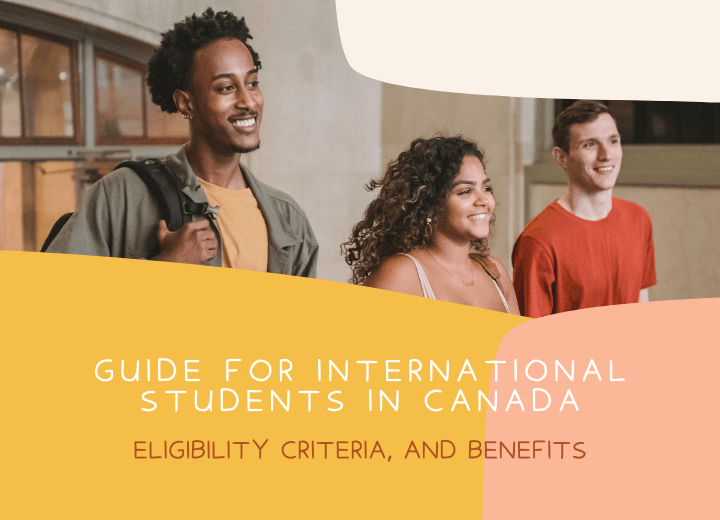Canada has been consistently ranking as one of the top countries catering to comfortable living conditions and is considered a desired destination for students to pursue their education. Both native and international students in Canada can study their favorite courses in premium institutions without any compromise.
In this article, we will not only tell you why Canada is such a popular destination among students but how you can get a student permit in the country hassle-free.
Why is Canada a Popular Destination for Education?
Canada offers national and international students multiple opportunities to study from top universities and educators at an affordable price. Let’s check the attractive facets of studying in Canada.
-
Top Educators and Mentors
From basics to advanced, elementary schools to post-secondary education, Canada has made a global image in terms of education, offering multiple courses in diverse fields of study. More than 10 Canadian universities hold a top position in the list of the best 250 universities across the globe.
-
Correct Future Projection
Students who graduate from Canadian universities generate a potential for strong earnings. In the last decade, the country has even created 1.6 million job opportunities for graduates. Its multicultural environment, stable economic and living conditions and wonderful climate also pique the interests of international students to study there.
-
Affordability and Cost of Education
Offering top-notch and diverse educational courses, the tuition fee in Canada is one of the lowest among English-speaking countries and is budget-friendly. Upon researching the living expenses and the accommodations, you will figure out that studying in Canada is cheaper than in other top education-providing countries.
-
Acceptance of Students
Embracing diversity, Canada welcomes international students with open arms helping them with all their necessities. Cultivating a positive and inclusive culture, its universities don’t allow any discrimination and provide all international students in Canada with the same opportunity of studying the subject and course they want.
How to Acquire the Student Permit in Canada
The student permit allows students to get their education in Canada. Students must apply for a study permit before coming to Canada. Here are the documents required to obtain a student permit in Canada:
- Letter of acceptance from the designated learning institute (DLI) you have applied to.
- Financial support proof is required.
- Identity proof is required.
- A custodian declaration is required if you are a minor.
- The Letter of Explanation is needed to justify your desire to study in Canada and to prove you are responsible as a student.
- An online portal is available for students outside of Canada and students already in Canada.
- Differently-abled people can apply for it offline (on paper) if they have an issue applying online.
Note: A visa is required even if you have a Canadian student permit.
International students with short term study programs (less than six months) don’t require a student permit. However, they would need a permit if the course exceeds six months. They will also not have to show the letter of acceptance for applying for a permit if they have a legal guardian or parent with Canadian citizenship.
Study Permit for Minor Student in Canada
A study permit for a minor student in Canada is only required if they are foreign nationals who, with their parents, have come to Canada as visitors. Conditions wherein a study permit are not required are:
- The student is a Canadian/permanent resident.
- They are foreign nationals who have come to the country with their parents who hold Canadian citizenship or are permanent/temporary residents.
- They came to study in Canada alone.
- They came to Canada with a parent who holds study/work permits.
- The student or their parents is a refugee claimant.
Curriculum of Students in Canada
A laptop with a stable internet connection is all students need when studying in Canada. Due to a sudden shift from offline to online mode, there is also an alteration in the grading system. Many universities have also cancelled the final examination. International students get assistance via email, phone calls, and video conferences.
Extension of Your Stay in Canada
You have to extend your stay if you are no longer a student in Canada. So it’s better to apply to extend your stay before your current visa expires. However, international students in Canada can stay up to 6 months from the entry date.
Employment as a Student in Canada
Generally, 20 hours per week is granted for students in Canada to work while studying. They can work off-campus during the academic term and full-time with scheduled breaks and holidays. However, during the pandemic, schools across the country were closed for an uncertain period, and getting employment for students in Canada became difficult.
-
Working on Campus
If you are an international student in Canada, you can work with the permit stating the eligibility to work on or off-campus. The documents required to work on campus are as follows:
– Social Insurance Number (SIN)
– A valid permit
-
Who Can’t Work on Campus
Students in Canada are not allowed to work on campus if:
- They are on authorized leave from the study.
- Their study permit has expired.
- They haven’t enrolled in any course and are switching schools.
Residence of Student in Canada
During the pandemic, international students in Canada were concerned about their accommodation. The government closed the residences of Canadian students temporarily to protect them from the outbreak.
However, exceptions were made for international students in Canada, and traveling allowance was provided so that they could go back to their native country. The Canadian government also imposed further regulations to protect students staying on rent from tenant eviction.
Even the hotels started offering self-isolation to international students in Canada as they were not supposed to move outside their hotel room for 14 days.
Wrapping Up
Canada offers diverse education courses and elaborate study materials to native and international students to pursue their education from top-notch universities. They also provide viable career counseling, excellent future projection and employment for students so that the latter is not left confused about their career choices after graduation. However, it is crucial that you do your research on the various premium educational institutes available in Canada so that it fits your educational needs and budget.
You May Also Read
Frequently Asked Question (FAQs)
The key points and format to write the statement of purpose are as follows:
– Personal information and introduction
– Academic Qualification
– The reason behind specific course selection
– The reason behind specific Institution
– Career goals
Yes, you must explain with a valid reason why you want to get your education from Canada. False information will lead to rejection.
Yes, attaching TOEFL/IELTS score in your statement of purpose will surely help increase the chances of your selection. However, it does guarantee your selection.
Yes, only if you have a fully-funded or full-tuition scholarship you can study for free in Canada.













